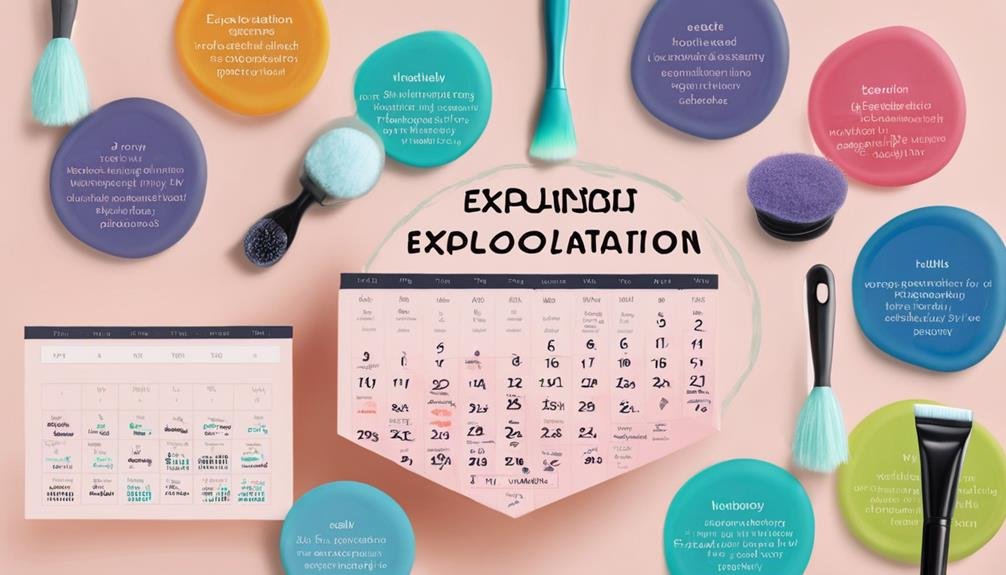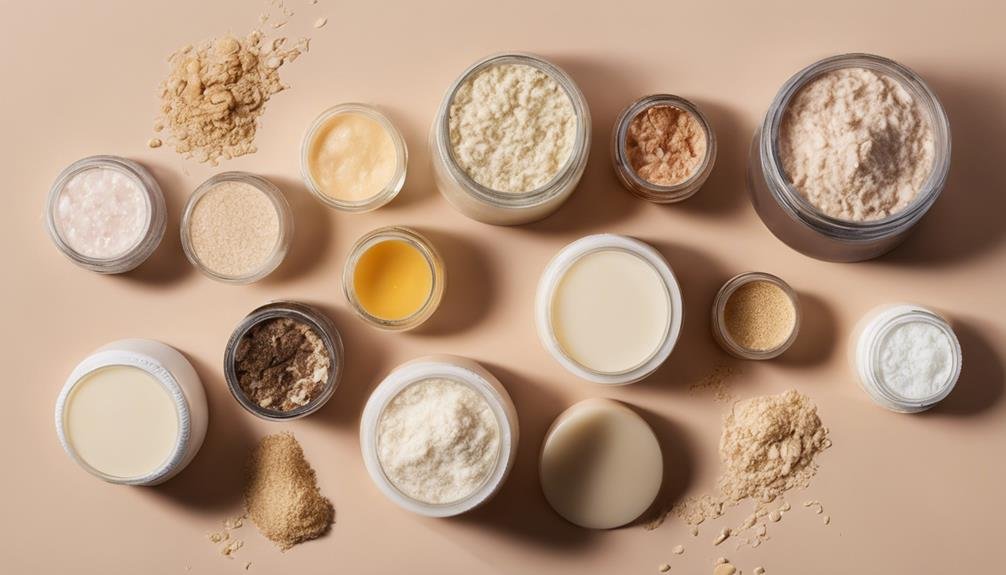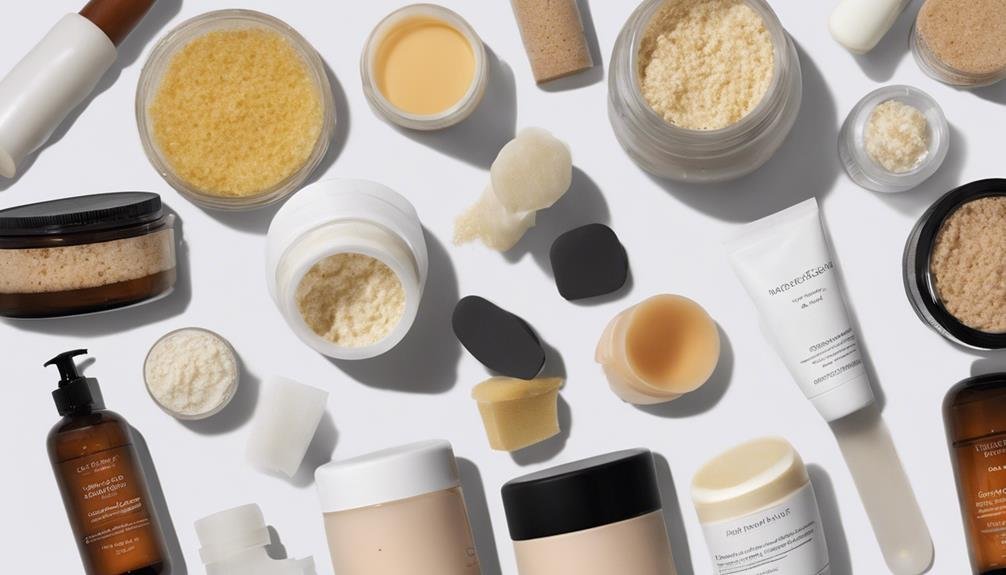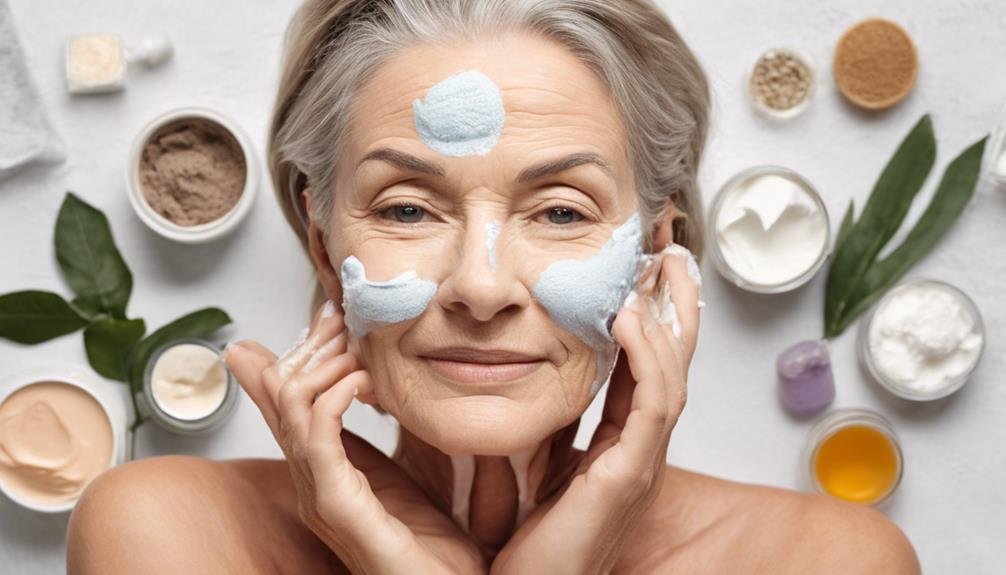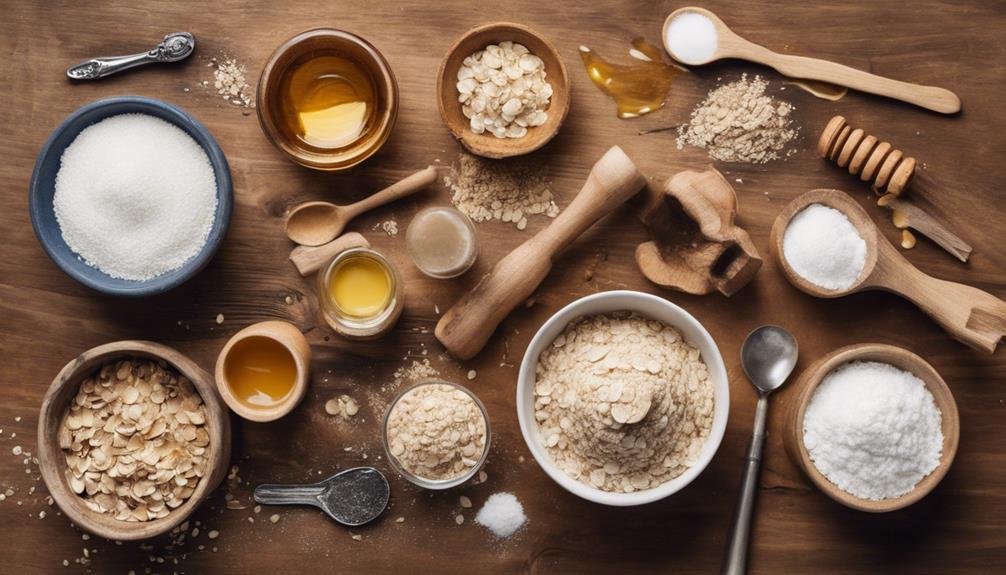When it comes to selecting the ideal exfoliator for your skin, the options can be overwhelming. But fear not, as we have some expert insights to guide you through this crucial decision-making process. From distinguishing between physical and chemical exfoliants to navigating the realm of exfoliating ingredients, there are key factors that you must consider to ensure your skin gets the care it deserves. So, how do you decipher which exfoliator will truly cater to your skin's unique needs and bring out the best in your complexion?
Key Takeaways
- Consider skin type: Dry, oily, combination, sensitive, or normal.
- Choose between physical or chemical exfoliators based on skin sensitivity.
- Determine exfoliation frequency according to skin type.
- Select AHAs for surface texture improvement, BHAs for pore cleansing.
- Experiment with textures and consistencies for best results.
Skin Type Assessment
When choosing the best exfoliator for your skincare routine, it's crucial to begin with a thorough assessment of your skin type. Understanding whether you have dry, oily, combination, sensitive, or normal skin will help you select an exfoliator that caters to your specific needs.
For dry skin, look for exfoliators with hydrating ingredients like hyaluronic acid or glycerin to prevent further dryness.
Oily skin benefits from exfoliators containing salicylic acid or clay to unclog pores and control oil production.
Combination skin may require a gentler exfoliator on dry areas and a more potent one on oily zones.
Sensitive skin types should opt for exfoliators with soothing components such as chamomile or aloe vera to prevent irritation.
Normal skin can tolerate a variety of exfoliators, but it's essential to choose one that maintains the skin's balance.
Physical vs. Chemical Exfoliators
To differentiate between physical and chemical exfoliators, it's crucial to understand the distinct mechanisms through which they work on your skin.
Physical exfoliators, like scrubs or brushes, work by physically sloughing off dead skin cells on the surface. They can be effective for immediate smoothing but may be harsh on sensitive skin or exacerbate conditions like acne.
On the other hand, chemical exfoliators, such as AHAs or BHAs, use acids to dissolve the bonds between skin cells, promoting cell turnover and revealing fresher skin underneath. They tend to be gentler and can penetrate deeper into the skin, making them suitable for various skin types, including sensitive skin.
When choosing between the two, consider your skin sensitivity, the specific skin concerns you have, and how often you plan to exfoliate. Experimenting with both types can help you determine which works best for your skin's needs.
Understanding Exfoliation Frequency
Understanding exfoliation frequency is a key aspect of maintaining healthy skin. Exfoliating too frequently can lead to irritation, while not exfoliating enough can result in a buildup of dead skin cells. Finding the right balance is crucial for achieving a glowing complexion. Here's a simple guide to help you determine how often you should exfoliate based on your skin type:
| Skin Type | Exfoliation Frequency |
|---|---|
| Dry | 1-2 times a week |
| Normal | 2-3 times a week |
| Oily | 3-4 times a week |
| Combination | 2-3 times a week |
These are general guidelines, so it's essential to pay attention to how your skin responds. If you notice any redness, irritation, or excessive dryness, you may be exfoliating too often. On the other hand, if you're not seeing any improvement in skin texture, you might need to exfoliate more frequently. Listen to your skin's needs to achieve the best results.
Ingredient Check: AHAs vs. BHAs
Exploring the realm of skincare ingredients, one commonly encountered choice is between AHAs and BHAs. AHAs, or alpha hydroxy acids, like glycolic acid and lactic acid, work on the skin's surface to exfoliate and improve texture. They're water-soluble and ideal for dry and sun-damaged skin.
On the other hand, BHAs, or beta hydroxy acids, such as salicylic acid, penetrate deeper into the pores, making them perfect for oily and acne-prone skin. BHAs are oil-soluble and possess anti-inflammatory properties, making them effective against acne.
When choosing between AHAs and BHAs, consider your skin type and concerns. If you have dry or sun-damaged skin and want to improve texture, opt for AHAs. If you struggle with oily skin, acne, or clogged pores, BHAs might be the better choice.
However, it's essential to introduce these ingredients gradually to prevent irritation. Always follow up with sunscreen during the day, as both AHAs and BHAs can increase sun sensitivity.
Considering Sensitivity and Allergies
Navigating the world of skincare ingredients extends beyond just choosing between AHAs and BHAs. When considering an exfoliator, it's crucial to factor in your skin's sensitivity and any potential allergies. Certain ingredients can be harsh on delicate skin or trigger allergic reactions, so it's important to be mindful of what you're applying to your face.
To help you make an informed decision, here's a table outlining common exfoliating ingredients and their potential effects on sensitive or allergic skin:
| Exfoliating Ingredient | Skin Sensitivity | Potential Allergens |
|---|---|---|
| Glycolic Acid | Medium | Rare |
| Salicylic Acid | Low | Rare |
| Lactic Acid | Low to Medium | Rare |
| Enzymes (Papaya, Pineapple) | Low to Medium | Rare |
Texture and Consistency Evaluation
When assessing exfoliators, the evaluation of their texture and consistency plays a crucial role in determining their effectiveness and compatibility with your skin type.
The texture of an exfoliator refers to how abrasive or gentle it feels on your skin. For sensitive skin, a finer texture like sugar or jojoba beads may be more suitable, while coarser textures like salt or crushed shells may be too harsh.
Consistency, on the other hand, relates to the form of the exfoliator – whether it's a scrub, gel, cream, or powder. Thicker consistencies like creams are often more hydrating, while gels can be refreshing and lighter on the skin.
Finding the right balance between texture and consistency is key to achieving optimal results without causing irritation or damage. Experimenting with different textures and consistencies will help you determine what works best for your skin's needs, ensuring a pleasant exfoliation experience tailored to you.
Exfoliation for Acne-Prone Skin
To effectively address acne-prone skin, selecting the right exfoliator is paramount. When dealing with acne, it's crucial to choose products that are gentle yet effective in unclogging pores and removing dead skin cells. Here are some tips for choosing an exfoliator suitable for acne-prone skin:
- Look for exfoliators with salicylic acid, a beta hydroxy acid that penetrates oil-filled pores and helps to reduce acne breakouts.
- Opt for exfoliators with gentle physical exfoliants like jojoba beads or rice powder to avoid irritating sensitive acne-prone skin.
- Consider chemical exfoliants containing glycolic acid or lactic acid, which can help in exfoliating the skin without the need for harsh scrubbing.
- Avoid harsh exfoliators with large, jagged particles that can cause micro-tears in the skin, leading to further irritation and potential breakouts.
- Always perform a patch test before using a new exfoliator to check for any adverse reactions on your acne-prone skin.
Hydration and Moisture Balance
Maintaining proper hydration and moisture balance is essential for healthy skin, regardless of your skin type. Hydration helps to keep your skin plump, smooth, and radiant, while a good moisture balance ensures your skin barrier functions optimally, protecting it from external aggressors. When choosing an exfoliator, it's crucial to consider its impact on your skin's hydration levels.
—
| Exfoliator Type | Effect on Hydration |
|---|---|
| Physical | Can strip natural oils if too harsh |
| Chemical | Can help with hydration if containing humectants like hyaluronic acid |
—
Physical exfoliators, such as scrubs, can sometimes be abrasive and strip the skin of its natural oils, affecting hydration levels. On the other hand, chemical exfoliators, like AHAs or BHAs, can actually aid in hydration if they contain ingredients like hyaluronic acid. Be mindful of how your exfoliator choice impacts your skin's hydration and choose one that helps maintain a healthy moisture balance.
Exfoliating for Aging Skin
Proper exfoliation is key when addressing the needs of aging skin. As your skin matures, cell turnover slows down, leading to a dull complexion and increased dryness. To combat these effects, it's crucial to choose the right exfoliator for aging skin. Here are some tips to help you make the best choice:
- Gentle Formulas: Opt for exfoliators with gentle ingredients like alpha hydroxy acids (AHAs) or beta hydroxy acids (BHAs) to avoid irritation.
- Anti-Aging Benefits: Look for exfoliators that not only remove dead skin cells but also contain anti-aging ingredients like peptides or antioxidants.
- Moisturizing Properties: Choose exfoliators that offer hydration to counteract the natural dryness that comes with aging skin.
- Frequency: Be mindful of how often you exfoliate – aim for 1-2 times per week to prevent over-exfoliation.
- Sun Protection: Always follow up with sunscreen after exfoliating to protect your skin from further damage.
Budget-Friendly Options
When considering budget-friendly options for exfoliators, prioritizing affordability without compromising quality is essential. Fortunately, there are several effective options that won't break the bank.
Look for exfoliators containing ingredients like salicylic acid or glycolic acid, which can help unclog pores and improve skin texture without costing a fortune. Brands like The Ordinary, CeraVe, and Neutrogena offer affordable exfoliators that are gentle yet effective.
Another budget-friendly option is to opt for physical exfoliators such as sugar scrubs or gentle brushes. These can help slough off dead skin cells and reveal a brighter complexion without the need for expensive ingredients.
When choosing a physical exfoliator, make sure it has round particles to prevent microtears on the skin.
DIY Exfoliation Recipes
For those seeking natural and cost-effective ways to exfoliate their skin, DIY exfoliation recipes offer a simple yet effective solution. If you're looking to pamper your skin with ingredients you likely already have in your kitchen, here are some DIY exfoliation recipes to consider:
- Coffee Grounds Scrub: Mix coffee grounds with a bit of olive oil for a stimulating and energizing scrub.
- Honey and Sugar Scrub: Combine honey and sugar for a gentle exfoliation that also moisturizes the skin.
- Oatmeal and Yogurt Mask: Blend oatmeal and yogurt for a soothing and nourishing mask that gently exfoliates.
- Baking Soda Paste: Create a paste using baking soda and water for a budget-friendly yet effective exfoliating treatment.
- Sea Salt Scrub: Mix sea salt with coconut oil for a revitalizing scrub that helps remove dead skin cells.
These simple recipes can provide your skin with the exfoliation it needs while avoiding harsh chemicals and unnecessary additives.
Patch Testing and Monitoring
To ensure the safety and effectiveness of any exfoliation method, patch testing and monitoring are essential steps in your skincare routine. Before incorporating a new exfoliator into your regimen, conduct a patch test by applying a small amount of the product on a discreet area of your skin, like behind your ear or on your inner arm. Monitor the area for 24 hours for any signs of redness, irritation, or allergic reactions. If no adverse reactions occur, you can proceed with using the exfoliator on a larger area of your skin.
Even if you have used a particular exfoliator before, it's crucial to continue monitoring your skin's response each time you use it. Skin sensitivity can change due to various factors such as weather, hormones, or medications. By staying attentive to how your skin reacts to exfoliation, you can adjust your routine as needed to prevent any potential irritation or damage.
Frequently Asked Questions
Can I Use an Exfoliator on My Lips?
You can use an exfoliator on your lips, but choose a gentle one specifically formulated for this delicate area. Avoid harsh scrubs that can damage or irritate the skin. Exfoliating can help remove dead skin cells and leave your lips smoother.
Is It Safe to Exfoliate if I Have Eczema?
Yes, it's generally safe to exfoliate if you have eczema, but caution is needed. Choose a gentle exfoliator suitable for sensitive skin. Test on a small area first and consult a dermatologist for personalized advice.
Should I Exfoliate Before or After Shaving?
Before shaving, exfoliate to remove dead skin cells and prevent ingrown hairs. This helps achieve a closer shave and smoother skin. After shaving, use a soothing moisturizer to hydrate and protect your skin.
Can I Use an Exfoliator on My Body?
Yes, you can use an exfoliator on your body. It helps remove dead skin cells, unclogs pores, and promotes smoother skin. Remember to choose a gentle exfoliator suited for your skin type and to moisturize afterward for best results.
How Soon Can I Apply Makeup After Exfoliating?
After exfoliating, wait at least 15-30 minutes before applying makeup. This gives your skin time to recover and prevents irritation. Remember to moisturize first, as exfoliating can leave your skin more sensitive. Enjoy your fresh glow!
Conclusion
As you navigate the world of exfoliators, remember that your skin is unique and deserves personalized care. Like a gentle breeze removing leaves from a tree, the right exfoliator can reveal a radiant complexion beneath the surface. Take the time to assess your skin's needs, experiment with different options, and prioritize its health and balance. With patience and diligence, you'll uncover the best exfoliator that leaves your skin glowing and refreshed.



